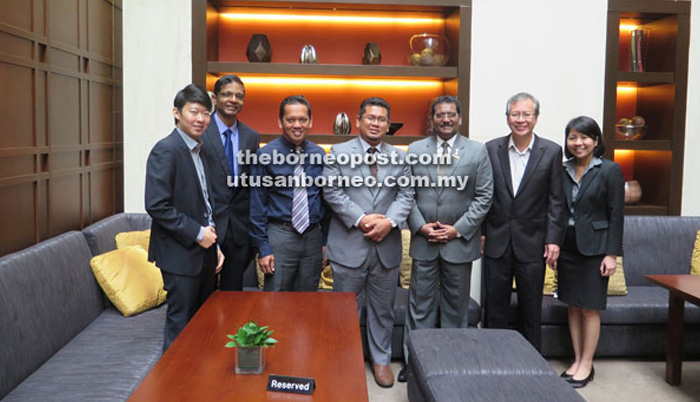![]() Home > Sabah
Home > Sabah
GST Appeal Tribunal Cases Drop Due To Greater Awareness

From left to right: Indrasathi (third from right) with other speakers at the GST Appeal Tribunal workshop.
![]() May 18th, 2017 | 08:26 AM |
May 18th, 2017 | 08:26 AM | ![]() 2007 views
2007 views
KOTA KINABALU
The number of appeal cases registered at the Goods and Services Tax (GST) Appeal Tribunal is dropping due to growing awareness.
M. Indrasathi, from the Ministry of Finance, Putrajaya, said during the GST Appeal Tribunal workshop organised by the Deloitte Tax Academy yesterday that there were 36 hearings in 2015, while last year, the number of hearings dropped to 34.
The number of appeal cases rejected also dropped from 406 cases in 2015 to 271 cases in 2016.
According to Indrasathi, the cases were rejected as they were beyond the jurisdiction of the tribunal.
He added that there were 17 appeals against the director general’s decision that the GST Appeal Tribunal had no jurisdiction to hear.
“The Tribunal has jurisdiction to determine appeals except on matters specified in the Fourth Schedule (Non Appealable Matters). There are 17 items/issues that cannot be appealed. These includes decisions on voluntary and group registration, compound of offences, instalments, penalty, offsetting tax, taxable period, remission, special refund, advance ruling and so on,” he said.
In a nutshell, the non-appealable matter under the fourth schedule comprised inherent statutory restrictions, direction to treat as a single taxable person, refusal to allow VR (under Section 24), refusal to allow GR (Section 27), reassignment of taxable period (Section 40(4)), offsetting against refund (Section 45), seizure and selling of goods for recovery (Section 47(2)), refusal to allow instalment payment (Section 51), disallow refund (Section 57(2)), refusal to refund amount already paid (Section 57(5)), refusal to remit penalty (Section 62(2)), refusal to approve special scheme (Part VIII), advance ruling (Section 77), exercising of Power Part X, compounding of offence (Section 121), reward (Section 171) and special refund (Section 190, 191, 192).
During the workshop, participants were also told that an aggrieved person may choose either to apply for a review to the DG or appeal to the tribunal.
Indrasathi encouraged the aggrieved person to first apply for a review and if he or she was dissatisfied with the DG decision, they may appeal to the Tribunal.
However, if they opted to appeal to the Tribunal, they may lose the right to apply for a review, he said.
The application for review must be made within 30 days from the date the person had been notified, provided no appeal had been made to the Tribunal or court, he said.
He urged that appellants came prepared for the Case Management Conference (CMC), which is a settlement discussion held between the respondent and the defendant and presided by the chairman.
“It is not a trial. Therefore, no witnesses are required to attend … generally, the CMC is about 30 minutes to one-hour long,” he explained.
Indrasathi added that appellants should come to the CMC prepared to deal with their case and that they should bring all the relevant documents and materials to fully discuss and present their position.
“Because time is limited, it would greatly assist the process to have sent copies of any documents or material that you intend to rely on to the opposing party ahead of time,” he further said.
He said that the purpose of the CMC was to settle the issues in dispute before going to trial or hearing.
“This may mean that a trial is ultimately not necessary. However, if a trial is still needed, it might be shorter and simpler because some of the issues have been resolved at the CMC,” Indrasathi said, adding no fee is charged for the review.
If the appellant decides to lodge an appeal, they need to submit the Form B which is the notice of appeal. A fee of RM200 will be charged.
Source:
courtesy of THE BORNEO POST
by BORNEO POST
If you have any stories or news that you would like to share with the global online community, please feel free to share it with us by contacting us directly at [email protected]